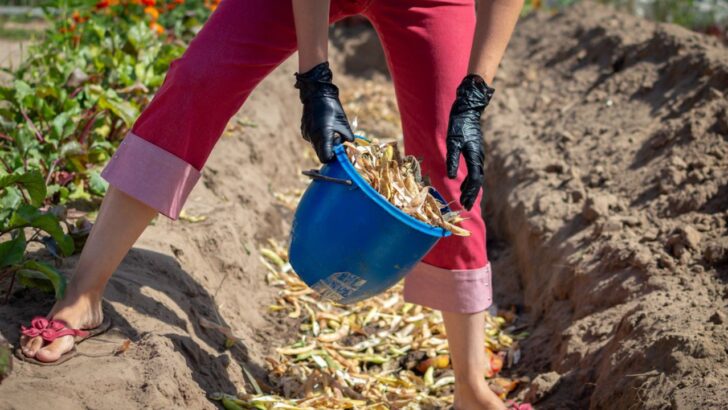A 2020 survey from the American Journal of Agricultural Economics revealed that Americans waste 30 to 40% of their food each year. What if leftover kitchen scraps, rotting food, and other food waste could be turned into something much more economical? Rich soil for your garden via composting.
While the data is old, a 2014 survey from the National Waste & Recycling Association found that 67% of people not composting would do so if it was more convenient. If you have the space but don’t want to fuss with a composting bin or watering and turning over trash, you might try burying it.
Sounds pretty wild, right? A video by Mark of Self Sufficient Me goes all out to show us what happens when you take your leftover scraps—yes, even those chicken bones—and bury them in your garden beds.
Why Bury Kitchen Scraps
Burying kitchen scraps in the garden isn’t a new idea. Our grandmothers were doing it long before it became a trendy gardening hack. For generations, people have relied on this simple practice (also known as trench composting) to nourish their gardens and recycle waste.
Here’s why this may be all you need to have your plants doing a happy dance.
1. Scraps Feed the Worms in Your Garden

Image Credit: Shutterstock.
When you take all the waste from your cooking session and bury it in your garden, your garden becomes a five-star buffet for worms. As the worms munch away at your buried fruit peels, vegetable ends, and even chicken bones, they break down the scraps into nutrient-rich castings (aka worm poop).
This gets mixed into the soil where your plants are. You’re feeding the worms while making your soil richer and more fertile.
2. You Get A Natural, Slow-Release Fertilizer
No need to spend big bucks on store-bought fertilizers with who knows what in them—your scraps are all you need. As they decompose, they release a steady stream of nutrients back into the soil. It’s a slow-release fertilizer, which means your plants get a continuous supply of vitamins and minerals all season long.
3. Improve Soil Structure
Burying your kitchen scraps benefits the whole garden ecosystem. When worms chow down on scraps, they also aerate the soil by creating little tunnels. These tunnels improve water flow and allow your plants’ roots to breathe and take in more nutrients.
You’re ensuring your plants receive the essential nutrients — and in sufficient quantities.
How to Bury Kitchen Scraps in Your Garden
1. Don’t Bury Too Shallow
If you bury too shallow, your garden may end up looking like a picnic site that was visited by a bear. Mark recommends digging a hole about 20 to 40 centimeters (8 to 16 inches) deep, and bury the scraps there. This means they break down properly and that pests (like rats or flies) don’t show up uninvited.
If you’re burying a dead animal such as a chicken or pigeon as he did, the deeper, the better for a clean, efficient breakdown. It also means your bigger pets, like cats or dogs won’t dig them and deliver them to your front door.
2. Don’t Overload One Bed
Be careful not to pile all your scraps into one spot. Too much organic material in one place can create an imbalance, and some may end up rotting and ruining your plants. Spread your scraps around and give your garden room to breathe.
3. Know What to Avoid
While most kitchen scraps are fair game, there are a few things you should keep out of the garden. Bones can technically break down, but they’ll take a long time and might attract unwanted visitors due to unpleasant odors. Go easy on them. Fish heads are an excellent fertilizer for tomatoes (they’re packed with phosphorus), but don’t overdo it.
Composting Made Easy?
Burying your scraps is called “the lazy man’s composting,” but there’s nothing negative about that. It’s less time-consuming, eliminates the need for a compost bin, and provides nutrients right where your plants need them — at their roots.


